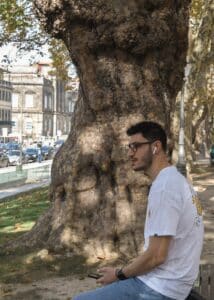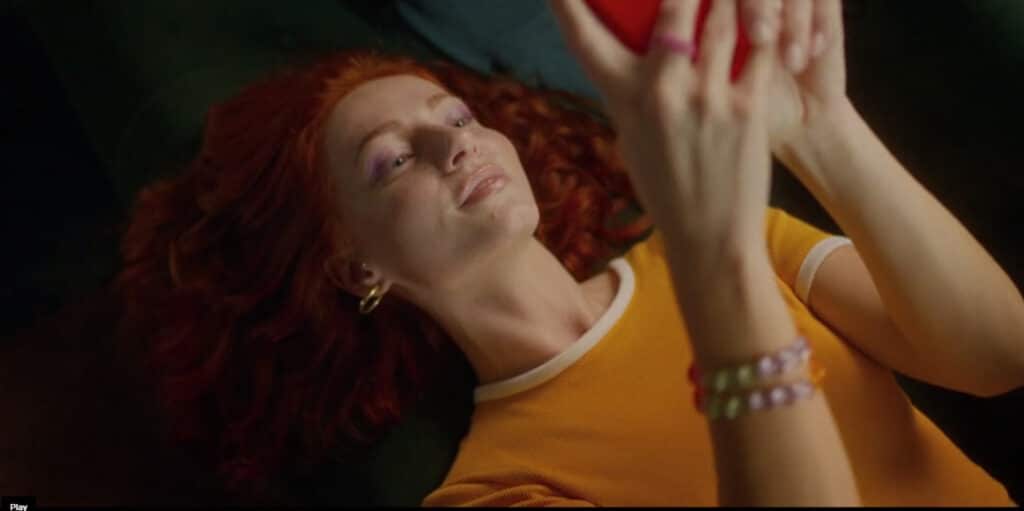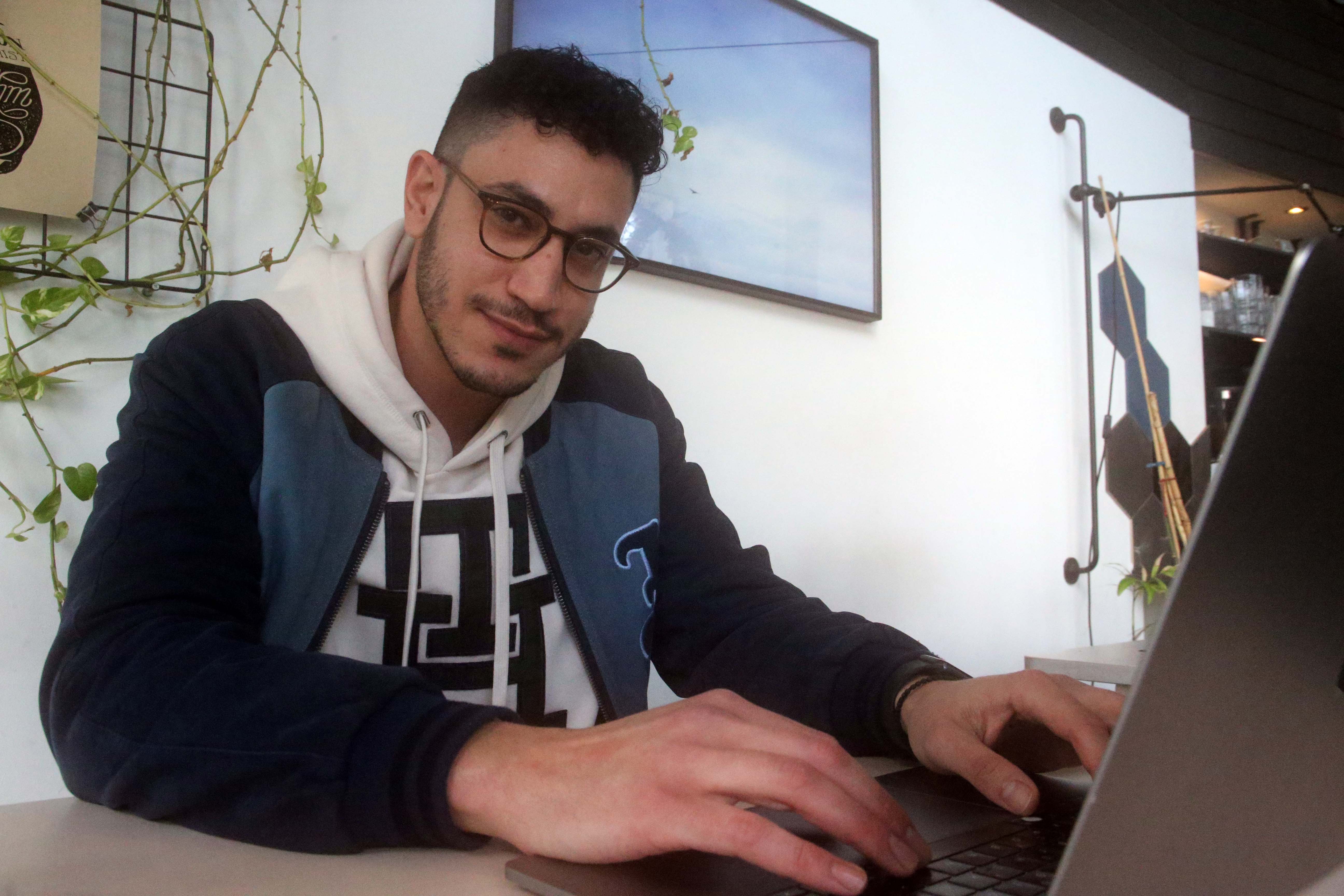In the creator of award-winning adverts, THEO PANAYIDES meets a driven, cool man who sees things other people can’t and believes the world should fight for Gaza, not feel sorry for it
Gaza hangs in the air, there’s no point denying it – but first we talk about Bean Bar, the coffee-shop franchise, for which Paris El-Said made an award-winning advert recently. (You can see it on his website, pariselsaid.com.) The opening shot of that commercial has a young woman walking by in the background, in a pink blouse and white pants. She only appears for two seconds, pushing a bicycle – but she’s actually the spitting image of an unknown woman he happened to glimpse on a trip to Vienna, snapping a photo at the time and recreating her on a Nicosia film set. The creative eye takes inspiration from all sorts of places.
Paris has always had the eye. He trains it, of course, watching 100-150 commercials every night after work – he trawls YouTube, Vimeo and Instagram, taking a screengrab if he spots some visual idea that might come in handy – but it’s always been the case that “I could see things that other people couldn’t”, even as a child. “I always had a camera, my dad’s camera. And I always took pictures that didn’t make sense to others… They’d always ask ‘Why did you snap this person walking? Why did you snap this child in the street?’. Because I could always find emotions through still frames.”

He’s 35, tall, bearded, bespectacled – and very animated, with a buzzy alertness. Even here, he admits, even as we’re sitting here talking “my eye is picking up people, and how they’re reacting to the sight of you holding a tape recorder”.
The eye sees everything, filing it away for future use. Commercials are often conceptual, which is sometimes the case for Paris too (his latest, for AlfaMega, is a cute little story of a kid trying to ‘do’ Christmas, before admitting that Mummy does it better) – but his strength actually lies in pure style, whether the mad explosion of rap-driven graphics in the Bean Bar ad (almost every shot comes with some visual curlicue) or the moody cinematic ambience in ‘A Sip of History’. Paris El-Said is where tired, or obscure, or conventional brands go when they want to look like the coolest brand ever.
There’s a paradox here, though he’s too diplomatic to agree outright. Isn’t he perhaps making (some of) his clients look better than they really are? “I’ll answer with a question,” he replies: “What would you do differently? Would you not make them look good?”. It’d be one thing if he were forced to be uncreative in order to please the client, but in fact the opposite is true – and getting truer.
“The greatest thing, which I think is starting to happen in Cyprus, is the education of the client.” After all, he says, “you have to sell. And how do you capture the audience’s attention? By doing stuff that’s different… [Clients] are starting to recognise and accept the different, and to realise that being different is what gets you far”.
Fair enough; but advertising (his sole occupation right now, though he’s made short films before and hopes to do so again) is a strange beast, the red-headed stepchild of filmmaking. Simply put, you’re a hired gun. “The secret of success for a good director of commercials is being able to adapt to situations,” is how he puts it. “You have to be like a chameleon. On everything – the budget, the needs of the client, the needs of the advertising company, the needs of the production. It’s not compromising, it’s being adaptable. ‘Compromise’ is a word that gets on my nerves a bit. I mean, you have the capacity to think differently – so why not do it?”
But what if you don’t agree with what’s being proposed?
“Of course… But that’s the skill of it, you have to find a way to show, in your own style, what the other person wants. It’s fine,” he shrugs, addressing some imaginary client – “you’re footing the bill, naturally we’ll do what you want. It’s your product. I’m not your strategic partner – I’m your creative partner.” Politics, too, shouldn’t really come into it. One of the ads on his website portfolio is for McDonalds – and some directors might not do an ad for McDonalds, dubbing it a tool of cultural imperialism and so on, but Paris has no such qualms. “My whole life is about being adaptable.”
He’s not a hack, let’s make that clear. Not only has he won awards, not only has he found an overseas agent and been invited to direct abroad (his most unusual gig was doing a commercial for a milk company in Vietnam), but he’s also very driven. Even in the not-too-competitive milieu of Cyprus he’s constantly stressed out – almost tormented – by the thought of always having to do something more, “something huge… You sit around, day and night, three, four o’clock in the morning, trying to get that idea where it’s like ‘Yeah, this could work’”. One might say he lives a double life: uncompromising when it comes to creativity, willing to compromise (sorry, adapt) when it comes to getting by in society.
It was always thus, in childhood too. Paris’ eye was always quirky, he saw things other people couldn’t – but “I have to say, in terms of personality, I tried to fit the mould when I was younger”, tried to be like everyone else. “Being different…” he shakes his head – “you don’t respect it when you’re young. You don’t appreciate it.”
And of course there’s something else, because he was slightly different. Paris’ mum is Cypriot but his father is Moein El-Said, a Palestinian who fled Lebanon at the time of the Israeli invasion (when he lost several members of his family) and later worked in Cyprus for the Red Crescent.

A shot from one of his ads
Did Paris’ Palestinian-ness define the kind of person he is now? “I’ve never thought of it like that, to tell the truth,” he replies thoughtfully – but his chameleon quality may indeed have something to do with constantly (if subconsciously) having to adapt as a kid, juggling the culture he lived at home and the culture of the outside world. Those early vibes, witnessing the slow-motion devastation of his father’s people, surely contributed to his driven, emotional side: “When you’re a kid and you’re living injustice through the TV, you’re bound to grow up trying to find solutions to a lot of things. Trying to find how you’re going to make other people feel good, how you’re going to make them happy”.
His dad and uncles – scattered all over, from Africa to Scandinavia – told him stories of the old days. He visited a couple of times as a child, and “it scarred me a bit”. He recalls getting off the bus and seeing a building pockmarked with bullet holes, with chairs hanging out of shattered balconies, a memory so vivid he could still draw it.
And of course we have Gaza today – not just an obvious disaster but also a bombing campaign which, with grim irony, comes with its own advertising campaign. Someone, whether Israel or friends of Israel, designed the billboards with photos of hostages – doubtless put together with the help of a creative, much like Paris himself – that we’ve seen on rooftops and along the side of the highway for the past few months. Does he not feel the urge to make something equivalent – to change hearts and minds – as both a half-Palestinian and an advertising man? I realise it’s only been three months, but…
That’s the thing, though, he interrupts, leaning forward with bright-eyed intensity: “You talk about three months – but for me it’s 35 years! It’s not something new for me. It’s part of my life, part of my story… I know exactly what happened, year by year. ‘Why haven’t you done something?’ is something I’ve asked myself too, many times”.
He actually has done ‘something’ – a personal documentary shot in Palestine five years ago, but the footage still lies untouched. “I can’t show it,” he explains, then goes further: “They’re images that I don’t think the world should see. Because all human beings have dignity, and we need to preserve that dignity… Yes, we should say what they’re going through. But what you show to the world, and how you show it – it’s a fine line between feeling sorry for someone and fighting for someone. I want to fight for them, not feel sorry for them.”
That’s the crux of it: whether because he is half-Palestinian – or because he’s a talented filmmaker with extremely high standards – he doesn’t want to do something tacky, or exploitative. Paris pulls no punches when it comes to the war, believing (unsurprisingly) that Israel is out of control: “The masks have fallen,” he affirms. “People have realised what’s going on. I’m not saying that what Hamas did on October 7th was right – but let’s not forget that Israel has been doing it since 1946”. Yet he also believes (unsurprisingly) that he’s not objective – and that, to create something credible, he needs to have both sides: “However well I know my own roots, I believe I’m missing pieces of knowledge”.
There’s another, more philosophical – and more depressing – aspect. I ask about activism, and he does care very much about injustice, says Paris – but Cyprus is so small, and the people in Gaza now (who “could’ve been us”, or people like us) are even more insignificant. Hundreds have been dying every day for weeks on end; protests have erupted all over the world, so much could be done to help them – yet nothing is done, no-one steps in, “nothing has changed. So you realise that you’re alone in the world. Truly, that whatever you do, you do on your own. Your safety is you. Your financial security is you. Everything, you’re alone. It’s a very tragic thing – but it’s reality, and we’d do well to realise it”.
It’s the despairing credo of a Palestinian, a young man who’s spent his life watching an indifferent world shut its eyes to his nation’s suffering – yet it’s also, in a whole other way, the empowering credo of a visual artist determined to make it in the world, armed only with his eye and the images swirling in his head.
At work he’s intense, admits Paris, always pushing himself. Does he argue? “Of course,” he replies with a laugh. “Constantly. Non-stop! It’s like, my favourite thing” – but everyone’s friends again once the shoot is over, and it’s not like he wants to be intense, it’s “because we all have the need to create something that stresses us out, which is out of our comfort zone”. When you’re on your own in the world – when your destiny is down to you alone – you need to keep pushing all day, every day. Then he’ll recharge, going back into adaptable mode: staying home, cooking a meal (he’s single, at least for the moment), hanging out with friends or just walking around observing people – their faces, reactions, peculiarities. The creative eye needs inspiration.
Gaza lurks in the background, through his father’s daily anguish (he’s lost many friends in the bombardment), through the TV news and all the things Paris knows about that don’t get shown on TV: “We don’t see 99 per cent of the reality”. He feels it but not the same way, he admits – feels the pain, yet can’t feel exactly what his father feels. It’s in his blood, but he hasn’t lived it. The eye, on the other hand, is real – his unusual way of looking at the world, the girl with the bike in Vienna, the stirring in his blood at the genesis of a brilliant idea. “I don’t like ceilings… I don’t want limits on things,” says Paris El-Said with feeling, losing himself in the power of art and exotic red-berry teas.







Click here to change your cookie preferences